Understanding Ayurveda and Hair Health
The Philosophy of Ayurveda in Hair Care
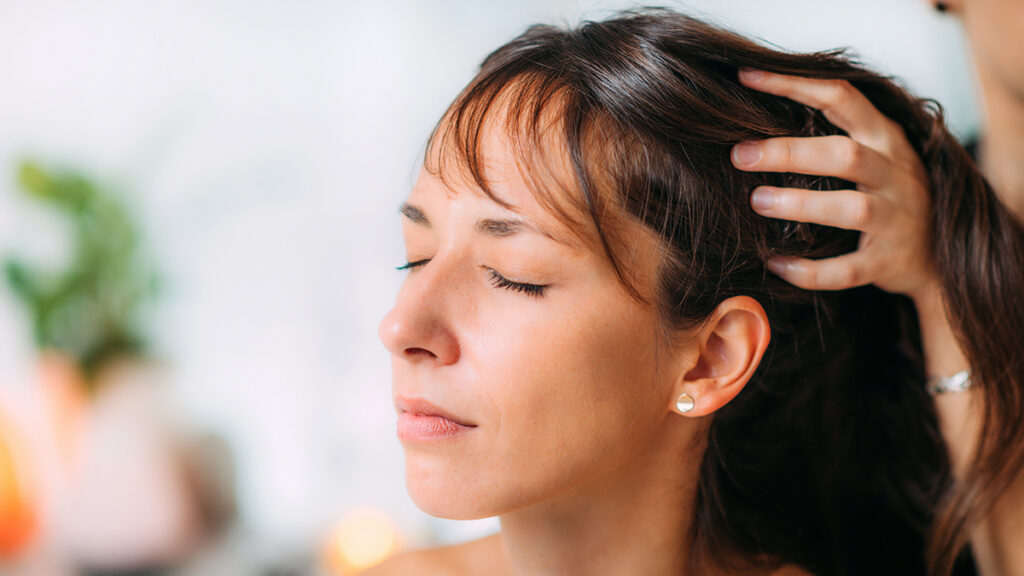
Ayurveda, an ancient Indian system of medicine, offers a unique approach to hair care that extends beyond the surface. It emphasizes the balance of the three doshas – Vata, Pitta, and Kapha – as the key to overall health, including the health of your hair. According to Ayurveda, each individual’s hair type is influenced by their dominant dosha, and understanding this is crucial to providing the right care for your hair.
Doshas and Hair Types: Vata, Pitta, and Kapha
- Vata Hair: Typically thin, dry, frizzy, or prone to split ends. Vata hair needs nourishing and moisturizing treatments to counteract its dryness.
- Pitta Hair: Often fine and soft, but prone to premature thinning or graying. Pitta hair benefits from cooling oils and ingredients that soothe the scalp.
- Kapha Hair: Usually thick and oily, Kapha hair can be heavy and prone to excessive oiliness. Light and invigorating hair care products are best for balancing Kapha.
The Interplay of Physical, Mental, and Emotional Well-being in Hair Health
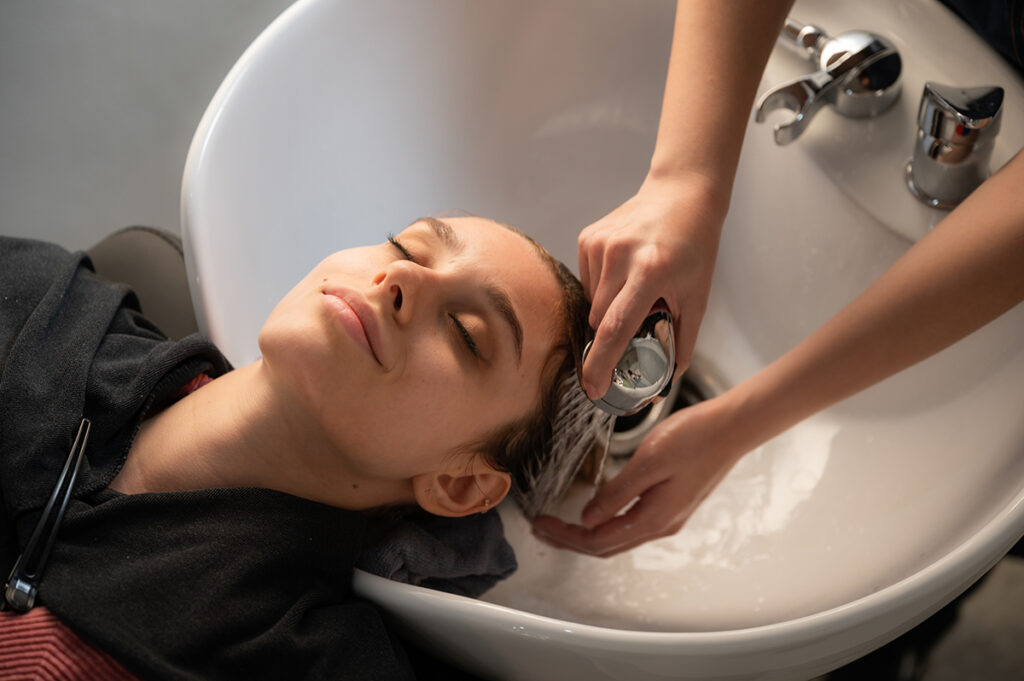
Ayurveda teaches that hair health is not just about external treatments; it’s deeply connected to our overall physical, mental, and emotional well-being. Stress, diet, and lifestyle choices play a significant role in the health of our hair. An imbalance in the body’s doshas, often caused by poor diet, lack of sleep, or stress, can lead to hair problems like hair fall, dryness, and premature graying. Therefore, a holistic approach, addressing both external treatments and internal health, is essential for maintaining healthy, vibrant hair.
In the next sections, we will delve into the specific Ayurvedic ingredients that can nurture and transform your hair, along with insights on how to incorporate these treasures into your hair care routine.
Key Ingredients in Ayurvedic Hair Oil
Amla (Indian Gooseberry)
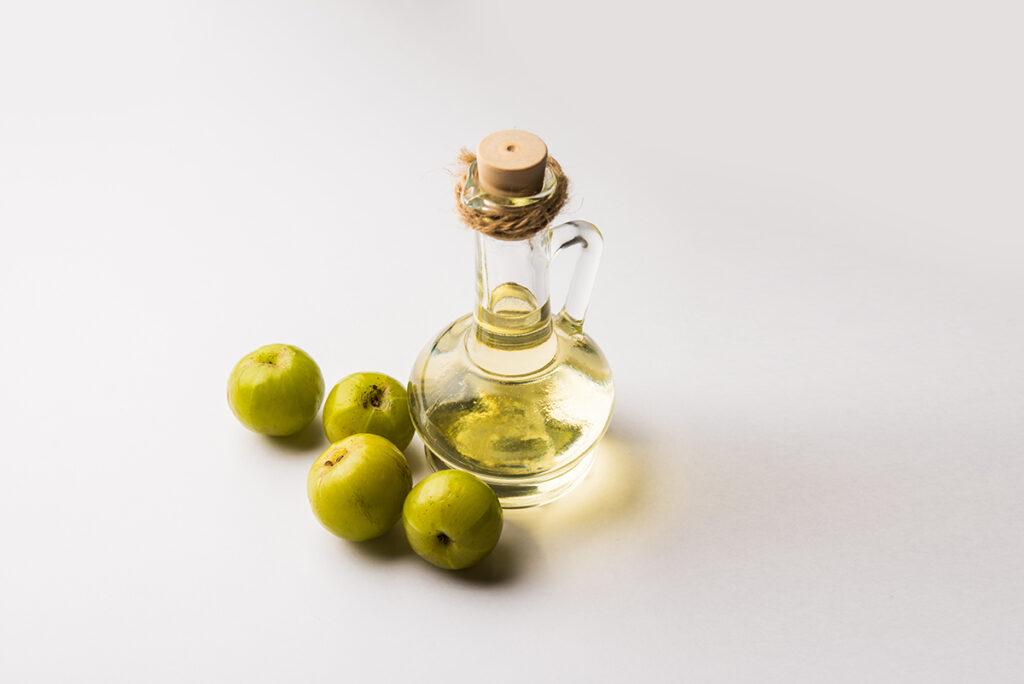
One of the most celebrated ingredients in Ayurvedic hair care, Amla, or Indian Gooseberry, is a powerhouse of nutrients and antioxidants. It is known for its ability to enhance hair growth and improve scalp health. Rich in Vitamin C and minerals, Amla strengthens hair follicles, promotes hair growth, and prevents premature graying.
Brahmi
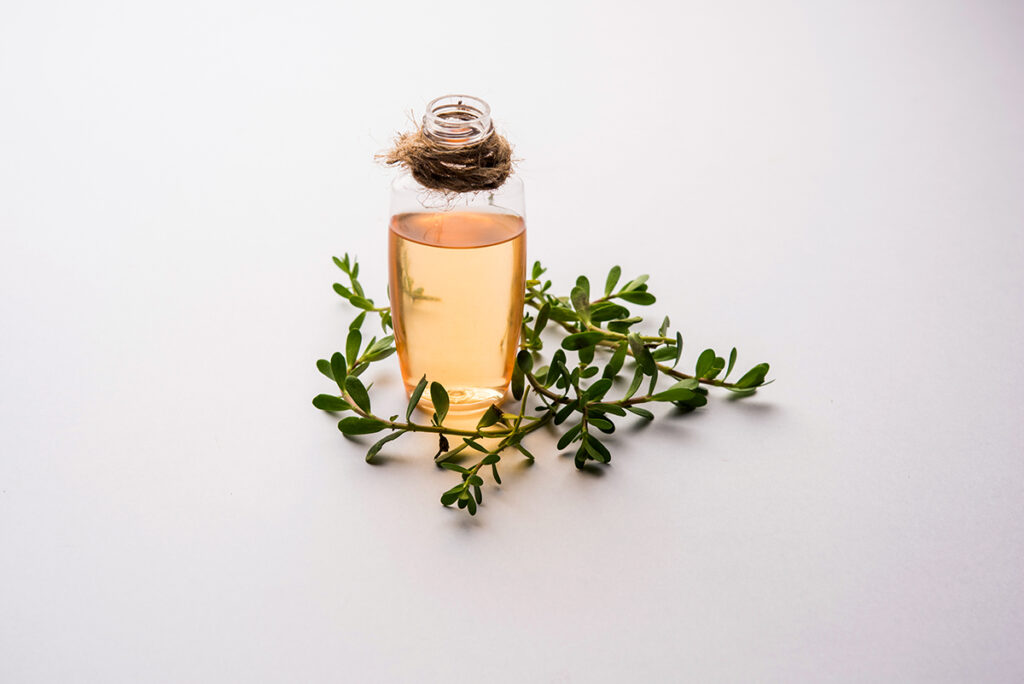
Brahmi, another revered herb in Ayurveda, is not only beneficial for cognitive function but also for hair strength. It nourishes the roots, soothes the scalp, and improves hair texture. Brahmi’s properties are especially beneficial in reducing hair fall and promoting thicker, fuller hair.
Bhringraj
Known as the ‘King of Herbs’ for hair care, Bhringraj is highly effective in rejuvenating the hair and scalp. It is traditionally used to stimulate hair growth, prevent baldness, and treat scalp issues. Bhringraj oil is often recommended for its ability to improve hair’s overall health and luster.
Neem
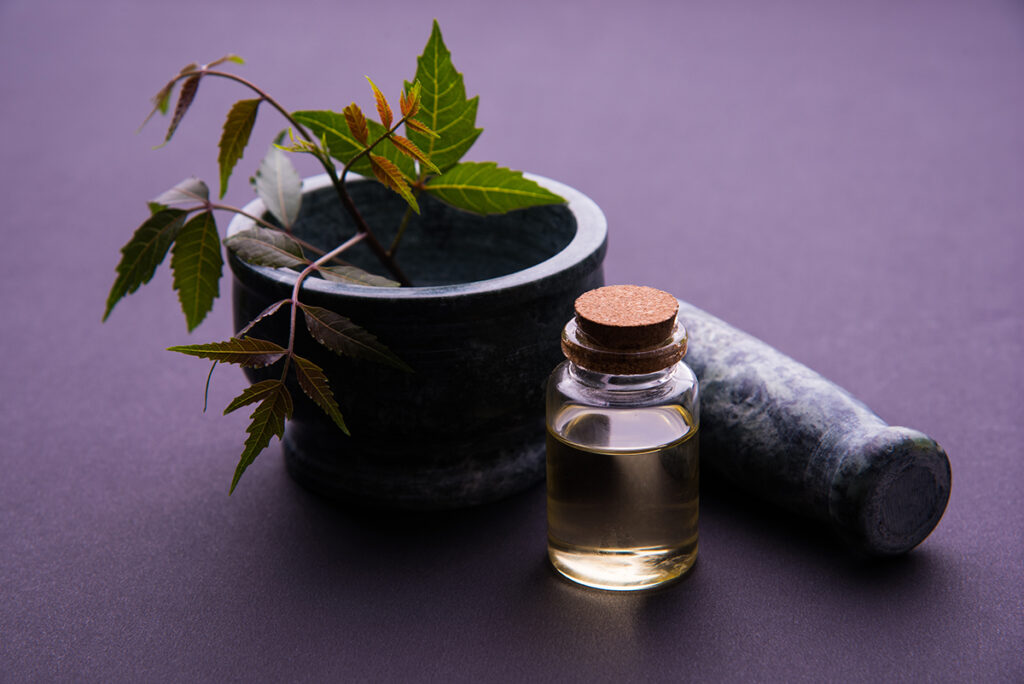
Neem has potent antifungal and antibacterial properties, making it an excellent ingredient for scalp cleansing. It helps in treating dandruff, scalp psoriasis, and itching. Regular use of Neem oil can also help in preventing hair thinning caused by environmental factors and scalp infections.
Fenugreek
Fenugreek seeds are a hidden gem in hair care. Rich in proteins and nicotinic acid, they are effective in combating hair fall and dandruff. Fenugreek also aids in moisturizing the hair and bringing back the luster and bounce to your locks.
Tulsi
Tulsi, or Holy Basil, is renowned for its antioxidant properties. It helps in reducing hair fall caused by stress and environmental damage. Tulsi oil can also soothe the scalp and reduce itchiness and dandruff.
Carrier Oils: More Than Just a Base
Coconut Oil
Coconut oil is a versatile carrier oil that deeply conditions and moisturizes the hair. It penetrates the hair shaft, providing nourishment from within. This oil is particularly beneficial for preventing hair breakage and split ends.
Sesame Oil
Sesame oil is traditionally used in Ayurvedic hair treatments for its nourishing and lustrous properties. It is known to promote hair growth, prevent premature graying, and protect the hair from harmful UV rays.
Almond Oil
Almond oil is excellent for softening and strengthening fine hair. Rich in vitamins E and D, it provides the necessary nutrients to the hair, making it soft, shiny, and healthy.
Jojoba Oil
Jojoba oil is unique in that it closely resembles the natural oil (sebum) produced by the scalp. This makes it an excellent choice for balancing oil production and adding a natural shine to your hair.
In the next section, we will explore the techniques and benefits of scalp massage in Ayurvedic hair care, an essential practice for stimulating hair growth and maintaining a healthy scalp.
The Art of Scalp Massage in Ayurvedic Practice
Scalp massage is a cornerstone of Ayurvedic hair care, revered not just for its relaxing effects but also for its ability to nourish and strengthen hair. It stimulates the hair follicles, promotes blood circulation, and aids in the deeper penetration of oils into the scalp.
Techniques for Stimulating Hair Growth
A proper scalp massage involves gentle circular motions using the fingertips. Begin at the front of the scalp and work your way back. Apply light pressure to stimulate circulation but avoid being too harsh, as this can damage hair roots. Regular scalp massage, ideally done with Ayurvedic hair oil, can significantly improve hair growth and scalp health.
The Role of Massage in Balancing Scalp Doshas
In Ayurveda, scalp massage is tailored according to one’s dosha. For Vata types, a warm, nourishing oil like sesame oil is ideal. Pitta types benefit from cooling oils like coconut oil, while Kapha types may find light oils like jojoba more suitable. By addressing the specific needs of each dosha, scalp massage helps in maintaining the natural balance, promoting healthier hair.
The Importance of Regular Scalp Massage in Hair Care Routine
Incorporating scalp massage into your regular hair care routine can have profound benefits. It not only nurtures the hair but also calms the mind and reduces stress, which is a common cause of hair problems. A routine scalp massage, ideally two to three times a week, is a simple yet effective way to enrich your hair care regimen.
In the next section, we’ll delve into the world of essential oils and their role in Ayurvedic aromatic therapy for hair care.
Incorporating Essential Oils for Aromatic Therapy
Essential oils play a vital role in Ayurvedic hair care, not only for their enchanting fragrances but also for their therapeutic benefits. These oils, when added to hair oil blends, can significantly enhance the health and vitality of your hair and scalp.
Lavender
Known for its calming and soothing properties, lavender oil is excellent for reducing scalp inflammation and stress, which are often underlying causes of hair loss and scalp issues. Its pleasant aroma also has a relaxing effect, making it perfect for nighttime hair care routines.
Rosemary
Rosemary oil is a powerful stimulant, making it ideal for promoting hair growth and enhancing blood circulation to the scalp. It’s particularly beneficial for those experiencing hair thinning or slow hair growth. Moreover, its refreshing scent invigorates the mind, offering a boost of energy.
Ylang-Ylang
Ylang-Ylang oil is renowned for its ability to balance sebum production in the scalp. This makes it an excellent choice for people with either overly dry or excessively oily hair. Its hydrating properties help maintain a healthy moisture balance, ensuring that the hair remains lustrous and vibrant.
Peppermint
Peppermint oil’s cooling effect stimulates blood flow to the scalp, which can encourage hair growth. Its invigorating scent is not only refreshing but also helps to rejuvenate the mind and body.
Incorporating these essential oils into your Ayurvedic hair oil blend can provide a holistic approach to hair care, addressing various hair and scalp issues while also offering a pleasant and rejuvenating experience.
Ayurvedic Diet and Lifestyle for Optimal Hair Health
A key aspect of Ayurvedic hair care extends beyond topical treatments; it also involves nurturing the hair from within through a balanced diet and a healthy lifestyle. Here’s how you can support your hair health through dietary and lifestyle choices.
Foods to Nourish Your Hair from Within
Ayurveda emphasizes the importance of a balanced diet for maintaining healthy hair. Include a variety of fresh fruits and vegetables, especially leafy greens, to ensure a good supply of vitamins and minerals. Nuts and seeds, rich in omega-3 fatty acids, are excellent for hair health. Protein-rich foods like lentils, chickpeas, and quinoa are also vital for strong hair. Ayurvedic principles suggest avoiding excessively spicy or fried foods, as they can aggravate the doshas, leading to hair issues.
Lifestyle Practices for Reducing Stress and Balancing Doshas
Stress is a significant factor that affects hair health. Practices like yoga and meditation are highly recommended in Ayurveda to reduce stress and balance the doshas. Regular exercise helps in improving overall circulation, benefiting not just your body but also your scalp and hair.
The Role of Hydration and Sleep in Hair Health
Hydration plays a crucial role in maintaining the health of your hair. Drinking adequate water throughout the day helps in keeping the hair hydrated and healthy. Additionally, getting enough sleep is crucial for the body’s rejuvenation process, which includes hair repair and growth.
By incorporating these dietary and lifestyle practices, you can significantly enhance the health of your hair. In the next section, we will explore how to customize Ayurvedic hair oil to cater to your specific hair needs and dosha imbalance.
Customizing Ayurvedic Hair Oil to Your Needs
Personalization is at the heart of Ayurvedic hair care. Understanding your unique hair type and dosha imbalance is crucial for creating an effective hair oil blend that caters to your specific needs.
Identifying Your Hair Type and Dosha Imbalance
Your hair type and predominant dosha play a significant role in determining the right ingredients for your hair oil. For example, Vata hair types, which are typically dry and brittle, benefit from nourishing oils like almond or sesame oil. Pitta hair types, prone to thinning and premature greying, may find coconut oil and cooling herbs like Brahmi more suitable. Kapha hair types, usually thick and oily, can benefit from lighter oils like jojoba and purifying herbs like Neem.
Creating a Personalized Hair Oil Blend
Once you understand your hair type and dosha, you can start crafting a hair oil blend that’s right for you. Mix carrier oils and herbs based on your specific needs. For instance, if hair fall is a concern, incorporating Bhringraj and Amla can be beneficial. If dandruff is an issue, Neem and Tulsi might be your go-to herbs.
Seasonal Adjustments in Hair Oil Formulation
Ayurveda also teaches that our hair care needs change with the seasons. In the dry, cold winter months, a more moisturizing oil may be necessary, while in the humid summer months, a lighter oil might be preferable. Adjusting your hair oil blend according to the season helps maintain the balance and health of your hair throughout the year.
By customizing your Ayurvedic hair oil, you’re not just treating your hair, you’re also aligning it with the natural rhythms of your body and the environment. In the following sections, we will delve into the ethical and sustainable aspects of Ayurvedic hair care.
The Ethical and Sustainable Approach in Ayurvedic Hair Care
In Ayurveda, the approach to hair care is not only about effectiveness but also about ethical and sustainable practices. As an Ayurvedic expert, I believe in the importance of using products that are good for both our bodies and the environment.
Choosing Organic and Cruelty-Free Products
Opting for organic hair care products ensures that the ingredients are free from harmful pesticides and chemicals, which is beneficial for both your hair and the planet. Moreover, cruelty-free products, which are not tested on animals, reflect the Ayurvedic principle of ahimsa, or non-violence.
Embracing Ayurveda’s Holistic and Sustainable Philosophy
Ayurveda teaches us to live in harmony with nature. This includes using hair care products that are sustainably sourced and made from natural ingredients. By choosing such products, we support eco-friendly practices and reduce our environmental impact.
The Impact of Packaging and Sourcing on Sustainability
The sustainability of a product is also determined by its packaging and sourcing. Products with minimal and recyclable packaging are preferable. It’s also important to consider the sourcing of ingredients, opting for those that are ethically and sustainably harvested.
Adopting an ethical and sustainable approach in our hair care routine not only benefits us but also contributes to the wellbeing of our planet. In the following sections, we will explore solutions to common hair problems using Ayurvedic oils.
Addressing Common Hair Problems with Ayurvedic Oil
Ayurvedic hair oils are not just for routine care; they are also potent remedies for various hair concerns. Here’s how Ayurvedic oils can be used to address some common hair problems.
Solutions for Dandruff and Scalp Itchiness
Dandruff and scalp itchiness can be effectively managed with Ayurvedic oils infused with Neem and Tulsi. These herbs have antimicrobial properties that help in reducing scalp infections. Regularly massaging the scalp with these oil blends can relieve itchiness and control flakiness.
Ayurvedic Remedies for Hair Thinning and Loss
Hair thinning and loss are often linked to stress, hormonal imbalances, or nutritional deficiencies. Oils containing Bhringraj, Amla, and Brahmi are excellent for promoting hair growth. They nourish the scalp, strengthen the hair follicles, and stimulate hair growth.
Managing Frizzy and Unruly Hair with Natural Oils
Frizzy and unmanageable hair can benefit greatly from oils like Coconut and Almond. These oils provide deep conditioning, reduce frizz, and improve hair texture, making your hair more manageable and smooth.
By incorporating these Ayurvedic oil treatments into your hair care routine, you can effectively tackle common hair issues and maintain healthy, lustrous hair.
Frequently Asked Questions (FAQs)
In this section, we’ll address some of the most common queries about Ayurvedic hair oil, providing insights and guidance to those exploring this natural approach to hair care.
What are the benefits of using Ayurvedic hair oil?
Ayurvedic hair oils are rich in natural herbs and oils that nourish the scalp, promote hair growth, prevent hair fall, and tackle issues like dandruff and premature graying. They offer a holistic approach to hair care, addressing both the physical and mental aspects of health.
How often should I use Ayurvedic hair oil?
It’s generally recommended to use Ayurvedic hair oil at least once or twice a week. However, this can vary depending on your hair type, dosha imbalance, and specific hair concerns.
Can Ayurvedic hair oil be used on colored hair?
Yes, Ayurvedic hair oils can be used on colored hair. However, it’s advisable to do a patch test first to ensure that the oil doesn’t affect the hair color.
Are there any side effects of using Ayurvedic hair oil?
Ayurvedic hair oils are generally safe and free from harmful side effects, as they are made from natural ingredients. However, it’s important to choose an oil that suits your hair type and to check for any allergic reactions to specific ingredients.
How long should I leave Ayurvedic hair oil in my hair?
For best results, it’s recommended to leave Ayurvedic hair oil in your hair for at least an hour or overnight before washing it off. This allows the oil to penetrate deeply and nourish the scalp and hair.
Can Ayurvedic hair oil help with hair thinning and hair loss?
Yes, many Ayurvedic hair oils contain ingredients like Bhringraj, Amla, and Brahmi, which are known for their effectiveness in promoting hair growth and reducing hair loss.
By understanding these aspects of Ayurvedic hair oil, you can make informed decisions about incorporating these natural remedies into your hair care routine.
Final Thoughts and Further Reading
As we conclude our exploration of Ayurvedic hair oils, it’s important to remember that hair care is an integral part of overall well-being in Ayurveda. The journey through traditional methods and scientific understanding offers a unique perspective on maintaining healthy hair.
Embracing a Holistic Approach
Ayurvedic hair care goes beyond just topical treatments; it encompasses a holistic approach that includes diet, lifestyle, and mental well-being. Incorporating Ayurvedic principles into your daily routine can lead to healthier, more vibrant hair and an overall sense of balance.
Continuous Learning and Experimentation
The field of Ayurveda is vast, and there’s always more to learn. I encourage you to continue exploring and experimenting with different oils and herbs to find what works best for your hair type and concerns. Remember, each person’s hair is unique, and what works for one may not work for another.
Recommended Resources
For those interested in delving deeper into Ayurvedic hair care, I recommend the following resources:
- “Ayurvedic Beauty Care” by Melanie Sachs
- “The Complete Book of Ayurvedic Home Remedies” by Vasant Lad
- Online resources and forums dedicated to Ayurvedic practices
Final Word of Advice
Always listen to your body and observe how it responds to different treatments. Ayurveda is not just about following guidelines but also about understanding and responding to the unique needs of your body.
Thank you for joining me on this journey through the essence of Ayurvedic hair oil. May you find balance, health, and vitality in your hair care practices.
